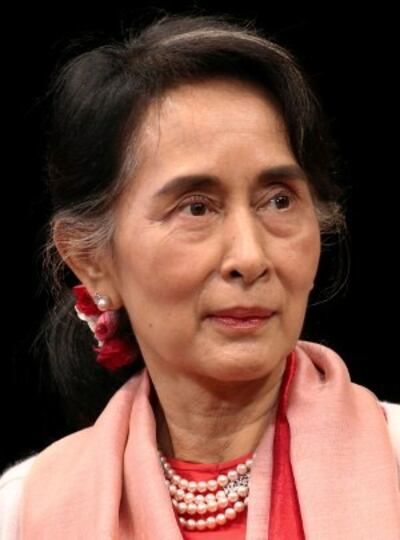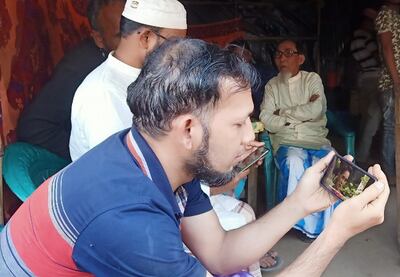Neighboring countries gave a tepid response to a coup in Myanmar on Monday, with no nation coming forward to condemn the military’s seizure of power, amid a general erosion of democracy in the region.
Thailand, which shares a border with Myanmar and has its own history of military coups that toppled democratically elected governments, had little to say in response.
“It’s their own business, it’s their internal affair,” Thai Deputy Prime Minister Prawit Wongsuwan told reporters in Bangkok.
Prawit has had a lead role in the Thai government since a 2014 coup overthrew the elected administration of Yingluck Shinawatra. Gen. Prayuth Chan-o-cha Prayuth became prime minister after the coup and retained the post in a 2019 general election widely viewed as rigged.
In recent months, the Thai government has cracked down on youth-led pro-democracy protests, charging dozens of activists on suspicion of violating a royal defamation law.
In the Philippines, a spokesman for President Rodrigo Duterte offered a similar response about the coup in Myanmar.
“This is an internal matter,” spokesman Harry Roque said, preferring to discuss the more than 1,200 Filipino expatriates in Myanmar.
“The primary concern is the focus is the safety of Filipinos … we can offer repatriation and temporary shelter in the embassy,” Roque told reporters.
Opposition leaders in the Philippines say that Duterte has increased the power of the military and police since taking office in 2016. By 2020, nearly 8,000 suspected drug addicts and dealers had been killed in Duterte’s so-called war on drugs, according to police. Human rights activists say the death toll is likely thousands more.
Both the Philippines and Thailand are founding members of the 10-state Association of Southeast Asian Nations (ASEAN), which includes Myanmar. The bloc’s core principles include a policy of non-interference in the domestic affairs of member states.
The sultanate of Brunei, which chairs ASEAN this year, noted that its Charter calls for “adherence to the principles of democracy, the rule of law and good governance, respect for and protection of human rights and fundamental freedoms,” in a statement on the coup on behalf of the bloc.

Myanmar leader arrested
Early on Monday, Myanmar’s military arrested Aung San Suu Kyi and other senior leaders, then declared a one-year state of emergency to deal with allegations of voting fraud tied to the general election in November, BenarNews, a sister entity of Radio Free Asia (RFA) reported.
Suu Kyi’s National League for Democracy party won 396 seats in parliament while the army-affiliated Union Solidarity and Development Party won 33.
Internet and telecommunications services in the capital city were shut down in the capital city, Naypyidaw, RFA reported.
“In order to execute the necessary actions including the re-examination of voter’s lists ... all legislative, administrative, and judiciary powers have been transferred to the military commander-in-chief,” said a statement issued by Interim President Myint Swe.
Senior Gen. Min Aung Hlaing will be in charge of the country, the Associated Press reported, citing a Myanmar military TV report.
The general, who has been Myanmar’s commander-in-chief since 2011, is under U.S. sanctions for his role in the 2017 crackdown against Rohingya that led hundreds of thousands to flee to neighboring Bangladesh.
Malaysian and Indonesian leaders expressed concerns about the military action.
“Malaysia calls on the Myanmar military and all relevant parties to give utmost priority to the maintenance of peace and security in Myanmar, uphold the rule of law, and resolve any electoral discrepancies through established legal mechanisms and dialogue in a peaceful manner,” the foreign ministry said in a statement.
“Malaysia reaffirms the strong support for Myanmar’s democratic transition, peace process and inclusive economic development.”
Malaysia currently has an unelected government, after the previous administration collapsed in February 2020, and is under its first national emergency in more than five decades to tackle rising coronavirus infections.
After the Malaysian king declared the emergency last month, Prime Minister Muhyiddin Yassin assured the nation that the move was not part of a coup, but said parliament and state assemblies would be suspended through Aug. 1.
In neighboring Indonesia, the Foreign Ministry said it was “deeply concerned” by the latest developments in Myanmar, and called for election disputes to be resolved through available legal mechanisms.
“Indonesia calls for the implementation of the principles contained in the ASEAN Charter, including the commitment to the rule of law, good governance, democratic principles, and a constitutional government,” the statement said.
Indonesia is the largest democracy in Southeast Asia, but a Brookings Institute report in late January claimed that “there is now scholarly consensus that Indonesia’s democracy has not just stagnated but is regressing.”
The report said President Joko “Jokowi” Widodo had presided over a period of increasing military involvement in public life, with figures linked to the dictatorship of former President Suharto now back in politics.

Rohingya, rights groups react
The government of Bangladesh, a South Asian country that shares a frontier with Myanmar, called for peace and stability for its neighbor, noting that it remained focused on the repatriation of Rohingya refugees.
“It’s my belief that we’ll be able to achieve our goal,” Foreign Minister A.K. Abdul Momen said.
About 1 million of the minority Muslims, including 740,000 who fled after the August 2017 crackdown in the Rakhine state, have settled in camps in and around Cox’s Bazar after being forced from Myanmar. The two countries signed a repatriation agreement in late 2017, but efforts since have failed.
Syed Ullah, leader of the Arakan Rohingya Society for Peace and Human Rights, a camp-based Rohingya organization, said the military coup might be good for the Rohingya.
“Aung San Suu Kyi supported genocide of the Rohingya in 2017 out of greed for power. Today she has become a prisoner of that power,” he told BenarNews. “The military needs international support, so, politically, the military could focus on the Rohingya issue.”
But Mostafa Kamal, a leader at the Leda refugee camp in Teknaf, was pessimistic.
“[I]f the situation in the country is turbulent, the issue of Rohingya return will not be discussed,” he told BenarNews.
Suu Kyi, an icon of Myanmar’s pro-democracy movement, was widely criticized after she led Myanmar’s legal defense in 2019, when the African nation of The Gambia sued Myanmar over allegations that its military had carried genocidal acts during the 2017 offensive against Rohingya insurgents in Rakhine state.
In Washington, U.S. President Joe Biden led Western nations in condemning the coup.
“The military’s seizure of power in Burma, the detention of Aung San Suu Kyi and other civilian officials, and the declaration of a national state of emergency are a direct assault on the country’s transition to democracy and the rule of law,” he said, using the old name for Myanmar.
“In a democracy, force should never seek to overrule the will of the people or attempt to erase the outcome of a credible election. For almost a decade, the people of Burma have been steadily working to establish elections, civilian governance, and the peaceful transfer of power. That progress should be respected.”
In Beijing, Chinese foreign ministry spokesman Wang Wenbin called Myanmar “its friendly neighbor” in commenting on the coup.
“We hope that all sides in Myanmar can appropriately handle their differences under the constitution and legal framework and safeguard political and social stability,” he said.
Reported by BenarNews, an RFA-affiliated online news service.
